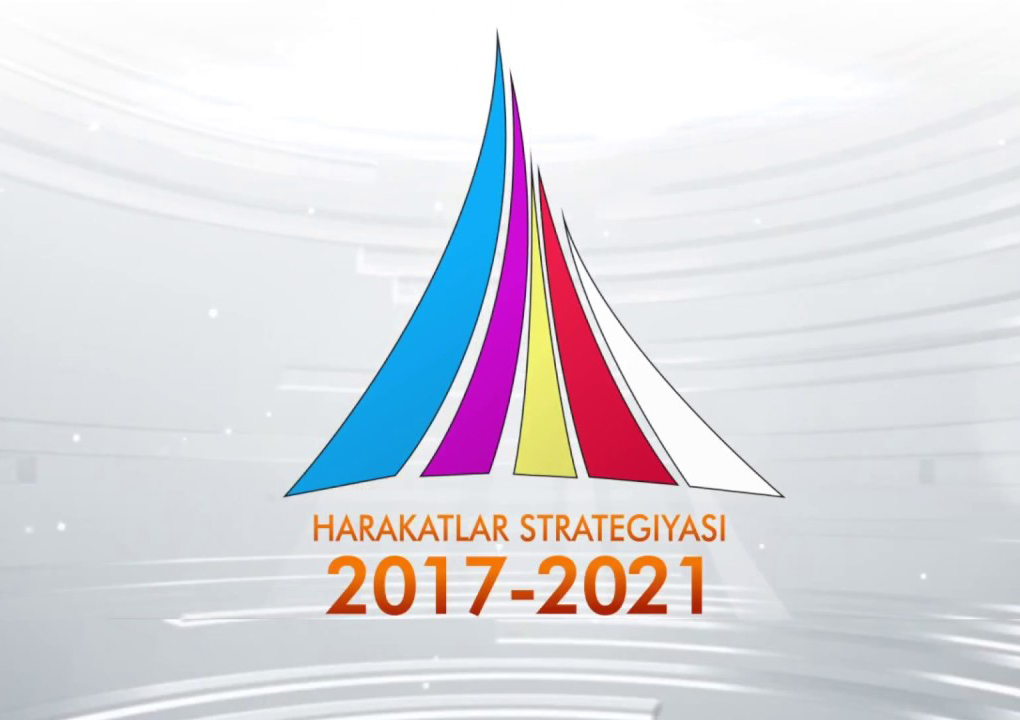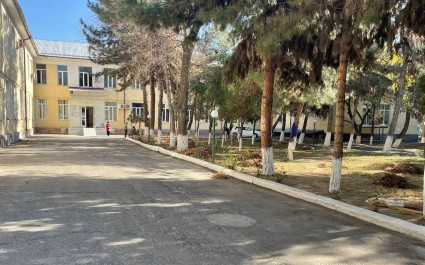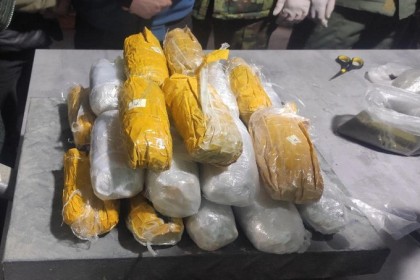President of Uzbekistan Shavkat Mirziyoyev signed a decree "On Uzbekistan’s Development Strategy ". The document has approved Uzbekistan’s Five-Area Development Strategy for 2017-2021 which was developed following comprehensive study of topical issues, analysis of the current legislation, law enforcement practices, the best international practices, and following public discussion.
The Decree has created a National Commission responsible for implementation of the Strategy which is headed by the President. Besides the President Shavkat Mirziyoev, the National Commission includes:
Yuldashev N.T.- Chairman of the Senate of Oliy Majlis
Ismailov N.M. - Speaker of the Legislative Chamber of Oliy Majlis
Aripov A.N.- Prime Minister
Inoyatov R.R.-Chairman of the National Security Service
Abdullayev I.B.-Prosecutor General
Makhmudov V.V. - Secretary of the Security Council under the President
Ismailov U.S.-State Advisor to the President
Sultanov H.M.- State Advisor to the President
Golyshev V.A.- State Advisor to the President
Akhmedbaev A.A.- State Advisor to the President
Yunuskhodzhaev A.N.- State Advisor to the President
Muradov O.B.-Acting State Advisor to the President
The Decree establishes that the timely and effective implementation of the Development Strategy shall be the top priority of all government bodies and their officials.
In the decree, the state bodies and entities, responsible for the implementation of measures envisaged in a state program, have been instructed to pay particular attention to:
- improving the system of handling of letters from natural and legal persons, introducing of new effective tools and methods to establish an open dialogue with ordinary people, putting in practice of a system of reporting to the public, strengthening among the public the trust in authorities;
- inadmissibility of bureaucratic barriers and obstacles when handling of letters from natural and legal persons and inadmissibility of transforming the process of dialogue with ordinary people into "window-dressing";
The Strategy is to be implemented in five stages, each of which provides for approval of a separate annual State program in accordance with a declared name of the year.
Five priority areas of Uzbekistan’s Development strategy for 2017-2021:
I. Priority areas for improving the system of state and public construction
1.1. Further strengthening the role of the Oliy Majlis (parliament), political parties in deepening the democratic reforms and modernization of the country:
- strengthening the role of the Oliy Majlis, further expanding of its powers in resolving the most important objectives of internal and foreign policies and implementing parliamentary control over the executive;
- improving the quality of legislative activity aimed at enhancing the influence of laws to the course of social, political, economic, legal and judicial reforms;
- development of the political system, strengthening the role of political parties in public life and society, formation of true political competition among them.
1.2. Reforming the governance system:
- reforming of public administration and public service through decentralization, skills enhancing, economic and social protection of civil servants, as well as through gradual reduction of state regulation of the economy;
- introduction of modern mechanisms of state-private partnership aimed at improving the effectiveness of mutually beneficial cooperation in achieving the goals of socio-political and socio-economic development of the country;
- ensuring transparency of government bodies, introduction of modern forms of informing in relation to the rights, freedoms and lawful interests of individuals and legal entities;
- improving the "e-government" system, increasing efficiency, quality of and access to public services for ordinary people and business entities.
1.3. Improving public management system:
- introduction of effective mechanisms for dialogue with ordinary people;
- development of modern forms of public control, increasing the efficiency of social partnership;
- supporting civil society institutions, enhancing their social and political activism;
- raising the significance and effectiveness of mahalla’s (neighbourhood) activities in public management;
- strengthening the role of the media, protection of journalists' professional activities.
II. Priority areas for ensuring the rule of law and further reforming the judicial system
2.1. Ensuring true independence of the judiciary, increasing the authority of courts, democratization and improving the judicial system:
- raising the status, the pay and social protection of judges and court staff, strengthening of material and technical base of courts;
- taking effective measures to prevent unlawful influencing on judges;
- full realization of the principles of independence and impartiality of courts, equal and adversary nature of the judicial process;
- wider application of Habeas Corpus, strengthening of judicial control over investigation;
- further specialization of courts, raising their staff;
- introduction of modern ICTs in the activities of courts.
2.2. Providing guarantees of protection of rights and freedoms of citizens:
- timely reviewing of citizens' appeals (complaints), ensuring the inevitability of punishment for allowing red tape, bureaucracy and indifference to consideration of appeals, as well as taking all necessary measures to restore the violated rights;
- guaranteeing protection of civil rights and freedoms by judicial, law enforcement and regulatory authorities;
- strengthening the guarantees of the right for private property;
- ensuring unhindered access to justice;
- improving the efficiency of enforcement of judicial acts and acts of other bodies.
2.3. Improving the administrative, criminal, civil and commercial law:
- improving and liberalization of criminal and criminal-procedural legislation, decriminalization of certain crimes, humanization of criminal penalties and the procedure of their execution;
- improving the efficiency and quality of justice, improving procedural bases of administrative, criminal, civil and economic justice;
- improving procedure of consideration of criminal, civil and commercial cases, reducing duplication of powers and authorities;
- introduction of modern forms and methods of e-proceedings and enforcement proceedings.
2.4. Improving the system of fight against crime and crime prevention:
- improving the efficiency of coordination of fight against crime and crime prevention;
- strengthening of organizational and practical measures aimed at fighting religious extremism, terrorism and other forms of organized crime;
- improving organizational and legal mechanisms for combating corruption and improving the efficiency of anti-corruption measures;
- improving the legal culture and legal awareness of the population, organizing effective cooperation between government bodies and civil society institutions, the mass media in this field.
2.5. Further strengthening of the rule of law in the judicial system:
- effective planning and analysis of the results of activities of law enforcement and regulatory authorities, to identify and eliminate the causes and conditions of systemic violations;
- improving the system of recruitment, training, retraining and advanced training, rotation within judiciary, law enforcement and regulatory authorities;
- introduction of modern mechanisms of institutional control on the prevention, suppression and prevention of crime among law enforcement and regulatory authorities;
- improving the efficiency of mechanisms of public control over the law enforcement and regulatory authorities' activities, strengthening of public confidence in the law enforcement system.
2.6. Improving the systems of legal aid and legal service :
- improving the efficiency of legal services by public authorities;
- development of a legal profession, enhancing the role of lawyers in criminal, civil, administrative and economic cases;
- reforming the system of notaries and registry offices.
III. Priority areas of economic development and liberalization
3.1. Further strengthening of the macroeconomic stability and the maintenance of high rates of economic growth:
- ensuring high growth rates of gross domestic product through maintaining macroeconomic balance, deepening of structural and institutional reforms by means of implementation of medium-term programs;
- ensuring balanced state budget at all levels while maintaining social orientation of expenses, improving inter-budgetary relations, focusing on raising the revenue part of local budgets;
- further improvement of monetary policy using instruments in line with best international practices and gradual introduction of modern market mechanisms of monetary regulation, ensuring stability for the national currency;
- maintaining policies of reducing tax burden and tax system simplification, improving tax administration and expanding the incentive measures;
- reforming and improving the stability of the banking system, the level of capitalization and deposit base of banks and strengthening their financial stability and reliability, expansion of lending to promising investment projects, as well as small and medium enterprises;
- expansion of the volume of insurance, leasing and other financial services through introduction of new types of services and improving their quality; development of financial markets as an alternative source of capital attraction and investment by enterprises, financial institutions and the public;
- expanding international cooperation, including with leading international and foreign financial institutions, upholding of prudent external borrowing policy, using foreign investments and loans effectively;
3.2. Improving the competitiveness of the economy through deepening of structural reforms, modernization and diversification of its leading industries:
- ensuring balancedness and stability of the national economy, increasing the share of services sector, SMEs in its structure;
- carrying out active investment policies aimed at modernizing, technical and technological renovation of production, implementation of production, transport-communications and social infrastructure projects;
- further modernization and diversification of the industry through upgrading to a new qualitative level, aimed at development of high-tech industries, primarily for the production of finished products with high added value on the basis of deep processing of local raw materials;
- creation of a competitive environment for industries and gradual reduction of the monopoly at commodity and services markets;
- promotion of production of new types of products and technologies, thereby ensuring the competitiveness of domestic products in foreign and local markets;
- continuation of policies aimed at encouraging local production and import substitution, especially of consumer goods and components, boosting inter-sectoral industrial cooperation;
- reducing energy consumption and resource intensity of the economy, widespread introduction of energy-saving technologies, increasing the share of renewable energy sources, increasing the economy's productivity;
- creating new and improving the efficiency of existing free economic zones, technoparks, small industrial zones;
- accelerated development of services sector, increasing the role and share of services in the gross domestic product, achieving a fundamental shift in the structure of services, primarily due to modern high-tech services;
- achieving accelerated development of the tourism industry, enhancing its role and contribution to the economy, diversification and improving the quality of tourist services, upgrading of tourism infrastructure;
- liberalization and simplification of export activities, diversification of the structure and geography of exports, expansion and mobilization of the export potential of industries and territories;
- further development of road transport infrastructure, introduction of ICTs in the economy, social sphere, control system.
3.3. Modernization and intensive development of agriculture:
- deepening of structural reforms and achieving rapid development of agricultural production, ensuring food security, expansion of production of ecofriendly products, achieving significant increase of export potential of the agricultural sector;
- further optimization of the sown areas, aimed at reducing the acreage of cotton and cereal crops, planting on released lands of potatoes, vegetables, forage and oilseeds, creating new intensive gardens and vineyards;
- encouraging and creating of favorable conditions for the development of farms, especially the multidisciplinary ones, which are engaged in agricultural production and processing, preparation, storage, marketing, construction works and provision of services;
- implementing of investment projects on construction of new, reconstruction and modernization of existing processing plants, equipped with modern high-end equipment for more advanced processing of agricultural products, production of semi-finished and finished food products, as well as packaging products;
- further expansion of infrastructure for storage, transportation and sale of agricultural products, provision of agro-chemical, financial and other up-to-date market services;
- further improvement of irrigated lands, development of the network of reclamation and irrigation facilities, widespread introduction in agricultural production of intensive methods, especially modern water- and resource-saving agricultural technologies, using high-performance agricultural machinery;
- carrying out R&D aimed at creating and introduction of new crop varieties and animal breeds with high productivity, resistant to diseases and pests and adapted to local soil, climatic and environmental conditions;
- adoption of systemic measures to mitigate the negative impact of climate change and drying of the Aral Sea to the development of agriculture and the livelihoods of people.
3.4. Continuing of institutional and structural reforms aimed at reducing the state's presence in the economy, further strengthening the protection of rights and priority role for private property, encouraging the development of small business and private entrepreneurship:
- ensuring reliable protection of the rights and guarantees for private property, removing of all barriers and restrictions, providing total freedom for the development of private entrepreneurship and small business, implementation of the principle - "If people are rich, then the state will also be rich and mighty";
- creating favorable business environment for the development of small businesses and private entrepreneurship, strict suppression of unlawful interference of state, regulatory and law enforcement authorities into the activities of business entities;
- further expansion and simplification of procedures for privatization of state-owned assets, reduction of the state’s stake in the authorized capital of economic entities, creation of favorable conditions for the development of private enterprises on the basis of privatized state assets;
- improving the investment climate, active attraction to the economy and provinces of foreign investment, especially foreign direct investment;
- introduction of modern international standards and corporate governance, strengthening the role of shareholders in the strategic management of enterprises;
- improvement of the mechanism and simplification of procedures for connecting businesses to engineering networks;
- reducing the state's role in the regulation of social and economic development, decentralization and democratization of the public administration system, expansion of public-private partnerships, enhancing the role of non-governmental organizations and local authorities.
3.5. Integrated and balanced socio-economic development of provinces, districts and cities, optimum and efficient use of their potential:
- ensuring integrated and efficient use of natural, mineral-raw materials, industrial, agricultural, tourism and employment potential of each province to accelerate socio-economic development, creation of jobs and raising incomes;
- reduction of differentiation in the level of socio-economic development of territories by expanding the scope of modernization and diversification of the economy of the territories, achieving accelerated development of the relatively backward territories and municipalities, primarily through increasing their trade and export capacities;
- active development of small cities and towns by creating in them of new plants and service centers, creation of small industrial zones, attracting of bank loans and private foreign investment;
- reduction of subventioned districts and cities, expansion of the revenue base of local budgets through rapid development of industries and services sector;
- further development and modernization of production, engineering, communications and social infrastructure of territories in order to create favorable conditions for industrial and other production facilities, extensive development of private entrepreneurship and improving the living conditions of the population.
IV. Priority areas of development of the social sphere
4.1. Consistent increase in real income and job creation:
- increasing real incomes and purchasing power of households, reduction the number of low-income families and the gap in incomes;
- gradual raising of pay of budget financed organizations, pensions, stipends and social allowances in a ratio higher than inflation rate;
- creating jobs and ensuring rational employment, especially for graduates of secondary and higher educational institutions and ensuring balancedness and development of infrastructure of labor market, reducing unemployment;
4.2. Improving social security system and health care, enhancing socio-political activity of women:
- providing mandatory social guarantees to the population, strengthening of social protection of vulnerable strata and the state support to the elderly and the disabled, improvement of social services, development of public-private partnership in the provision of social services;
- further reforming of public healthcare, especially primary healthcare, first aid and emergency medical services, aimed at improving the availability and quality of health and social services, promotion of healthy life style among the population, strengthening the material-technical base of medical institutions;
- enhancing the socio-political activity of women, strengthening their role in the management of the state and society, creating jobs for women, graduates of professional colleges, engaging them in entrepreneurial activities, further strengthening the foundations of the family;
- taking further comprehensive measures to promote healthy family values, maternity and childhood, ensuring greater access of mothers and children to quality healthcare, providing them with specialized and high-tech healthcare, reduction of infant and child mortality;
- further development and improvement of medical and social assistance to pensioners, the disabled, single elderly and other vulnerable groups to ensure they have a full-fledged life;
- further development of the pharmaceutical industry and providing the population and healthcare institutions with affordable, high-quality medicines and medical products, carrying out measures to prevent unjustified rise in prices for medication;
- ensuring reduction in morbidity of the population and increasing life expectancy.
4.3. Implementation of targeted programs to build affordable housing, development and modernization of road transport, engineering, communications and social infrastructure, ensuring the improvement of living conditions of the population:
- further improvement of living conditions of the population, especially of young families, residents of dilapidated houses and other citizens in need of better housing by providing mortgage loans on preferential terms and construction of affordable housing in urban and rural areas;
- improving of utility services, provision of clean drinking water in rural areas through construction of new water pipelines, steady introduction of modern cost-effective and efficient technologies;
- ensuring environmental safety, construction and modernization of recycling of household waste, strengthening their logistical base, providing households with modern waste management facilities;
- achieving major improvement of transport services, raising passenger safety and reduction of harmful emissions into the atmosphere, purchasing of new comfortable buses, construction and reconstruction of bus stations;
- further construction and reconstruction of road infrastructure, particularly, development of regional roads, overhaul and repair of off-farm rural roads, streets in settlements;
- improving access to electricity through construction of new and modernizing of existing electricity generating capacities, upgrading of low-voltage power grids and transformer substations, as well as implementation of measures to improve the provision of households with other fuel and energy resources and increasing the use of renewable energy;
- development and improvement of activities of theaters, cultural and educational institutions and museums, strengthening their material and technical base.
4.4. Development of education and science:
- maintaining the policies aimed at further improving the system of continuous education, increasing access to quality education, training of qualified personnel in accordance with the demand of the labor market;
- implementing targeted measures aimed at strengthening the material-technical base of educational institutions through construction, reconstruction and repair, equipping with modern teaching and laboratory equipment, computers, teaching aids;
- increasing number of preschools and achieving major improvement of conditions in these facilities for comprehensive intellectual, aesthetic and physical development of children, ensuring affrodability, and significantly increasing enrollment in preschools, raising the skills of teachers and specialists;
- achieving major improvementof in quality of general secondary education, facilitating in-depth study of foreign languages, computer science, and other important and popular disciplines, including mathematics, physics, chemistry, biology;
- construction of new, reconstruction of existing children's sports facilities and music and art schools with a view of engaging of children in mass sports, and to the world of music and arts;
- improving training and employment of students of professional colleges on specialties that meet the requirements of the market economy and the needs of employers;
- improving the quality and effectiveness of higher education institutions through introduction of international standards of training and assessment of the quality of teaching, gradual increase in admission quota;
- stimulating research and innovation, creation of effective mechanisms for the implementation of scientific and innovative achievements into practice, creation of scientific and experimental specialized laboratories, high-tech centers, industrial parks at universities and research institutes.
4.5. Improving the state youth policy:
- upbringing of physically healthy, spiritually and intellectually developed, independently thinking youth, dedicated to homeland with solid life views, improving their social activity in democratic reforms and development of civil society;
- employment and engaging to private entrepreneurship of graduates of secondary specialized, vocational and higher educational institutions;
- supporting and realization of creative and intellectual potential of the youth, promoting healthy lifestyle and sports among them, engaging them into healthy lifestyle and sports;
- providing social protection to the youth, creating decent housing and social conditions for young families
V. Priority areas in the field of security, inter-ethnic harmony and religious tolerance, and implementation of balanced, mutually beneficial and constructive foreign policy
5.1. Priority areas in the field of security, religious tolerance and inter-ethnic harmony:
- protection of the constitutional order, sovereignty and territorial integrity of the Republic of Uzbekistan;
- improving the information security system and protection of information, timely and adequately countering the threats in the information sphere;
- strengthening civil, inter-ethnic, inter-religious peace and harmony;
- strengthening the state’s defense capacity, increasing the combat capability and military efficiency of the Armed Forces of the Republic of Uzbekistan;
- prevention of ecological effects that cause damage to the environment, health and gene pool of the population;
- improving the system of prevention and elimination of consequences of emergency situations.
5.2. Priority areas in the implementation of balanced, mutually beneficial and constructive foreign policy:
- strengthening the independence and sovereignty of the state, further strengthening the place and role of the country as a full subject of international relations, joining the ranks of developed democratic states, creation of a security, stability and good neighborliness belt around Uzbekistan;
- strengthening the international repitation of the Republic of Uzbekistan, making available to the international community of the objective information on the ongoing reforms in the country;
- improving the legal framework of the foreign policy and foreign economic activities of the Republic of Uzbekistan, as well as the legal basis for international cooperation;
- resolving issues of delimitation and demarcation of the state boundary of the Republic of Uzbekistan.















